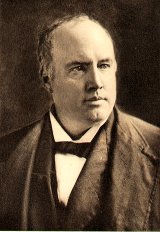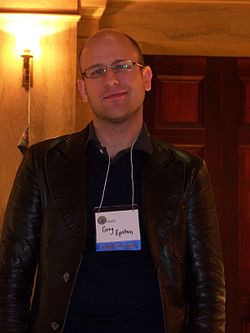Gleaned via my time machine from over 2000 years in the future, the debate over scripture still rages...
Q: I'm unclear about the nature of the Trinity. Can you explain it in more detail?
A: The nature of the Trinity is a tricky subject even for scholars. Essentially, the Godhead is composed of Santa Claus, Frosty (the Son) and Rudolph (the Spirit). Though Santa Claus is the ruler of the North Pole, admittance to the Pole is only achieved through belief in Frosty. Rudolph, as the Spirit, is both a part of and apart from Santa and the Son. Additionally, Rudolph may manifest himself within others, including Frosty but not Santa Claus (whose will rules all). Frosty may manifest Himself in Rudolph, though He does not manifest in man (since He is part man and part divinity). All of the authors of Scripture were possessed of Rudolph while writing, and this is why we say that Santa manifested Himself through Rudolph to produce a completely inerrant work. Simple, isn't it?
Q: Santa is depicted as a rather portly Being, and yet He can slip down chimneys with ease. How is this logically possible?
A: Remember that we are speaking of the chimneys of antiquity and not the ones found in homes today. Archeological digs supervised by our own Ministry have unearthed chimneys as large as 15 feet square, thus fully capable of accommodating Santa's legendary girth. However, the problem is moot since Santa, being divine, could go through the key hole if he so desired.
Q: The Book of "'Twas" lists eight reindeer, and yet Rudolph makes nine. How do you explain this obvious discrepancy?
A: A careful reading of the relevant passage easily harmonizes this "discrepancy"…
…When, what to my wondering eyes did appear
But a miniature sleigh, and eight tiny reindeer.
Scripture makes specific reference to "eight TINY reindeer". Rudolph was a reindeer of average proportions. Therefore, there is no discrepancy. The sleigh was being pulled by eight "tiny" reindeer and one normal sized reindeer, namely Rudolph.
Q: How did Santa navigate in foggy weather before Rudolph? Are we to believe that there were no foggy Clausmas nights prior to His birth?
A: Yes. In fact, there were no foggy nights period before the advent of Rudolph. Scripture clearly teaches that Santa created fog to punish "all of the other reindeer" for laughing at Rudolph's radiant nose and the sin of idolatry. Since that time, however, Rudolph's glorious light has led many out of sin and into the eternal holiness of the North Pole, there to bask in the glory of the True Claus.
Q: How do we know that Frosty is the Son of Santa? He's not even mentioned in the Book of 'Twas.
A: You need to read more carefully, my friend! Frosty is clearly referred to many times…
The moon on the breast of the new fallen snow
Gave luster of midday to objects below…
…is a clear reference to Frosty's nature as both snow and man (that is, "breast" fed) and his ability to "shine light" upon (or illuminate) objects below. Additionally,
…his clothes were all tarnished with ashes and soot.
…is a clear reference to Frosty's coal (or "ashes and soot") eyes. Also, both Frosty and Santa smoke pipes, wear hats and are jolly. What more evidence do you need?
Q: Isn't Frosty just another "resurrection" god, much like Adonis, Jesus and Osiris? And what's so special about His resurrection anyway? Doesn't water turn into snow automatically when the temperature drops?
A: The resurrection of Frosty differs in many ways from that of others. First, Frosty did not just "turn into snow" by some capricious act of nature, but rather his resurrection was self-willed. Secondly, He Himself forecast His own resurrection - it was not forecast by local weather stations of the period, contrary to the opinions of some skeptics. And finally, He forecast His ultimate return to earth to judge the unworthy with His last remark…
…he waved goodbye, saying
"Don't you cry, I'll be back again someday!"
I'll be ready for his return. Will you, my friend?
Q: In the often quoted passage…
Here comes Santa Claus
Here comes Santa Claus
Who despises all things homosexual in nature and will cast their sinning asses into hell
Right down Santa Claus lane…
…the third line doesn't seem to "scan" with regards to the rest of the text. Is it possible that the text has been tampered with in some way?
A: No. It is a common ploy among those with a homosexual agenda to try to discredit Scripture by claiming that those who wrote it had some sort of bias or political agenda. Just because they don't like what Santa had to say about their lifestyle is no reason for them to try to re-write Scripture. Much the same argument has been advanced by pro-abortionists who view …
…It's a beautiful sight,
we're happy tonight,
Santa hates baby-killers,
Walkin' in a Winter Wonderland….
…as some sort "altered" text. The authors of the Scriptures were DIVINELY moved by the will of Santa through the power of Rudolph. They had no political agenda whatsoever, and in fact, we have good evidence to support the claim that most were far too uneducated to even spell the word "agenda".
Q: The verse…
…there must have been some magic in that old silk hat they found
For when they placed it on His head, He began to dance around…
…seems to strongly imply that magic was involved in Frosty's initial creation. Yet the Church forbids such practices. Explain.
A: This is purely a problem of translation, not doctrine. The word "magic" here comes to us from the root maj - ika, which means literally "divinely given holy power of the Santa". Some newer versions of Scripture have actually edited out this deceptive translation and the text now reads (as it always should have)…
…there must have been some divinely given holy power of the Santa in that old silk hat they found…
…and there was, my friend, there was.



















































